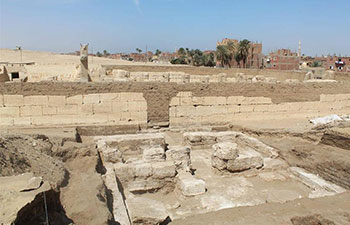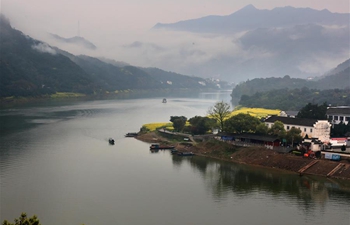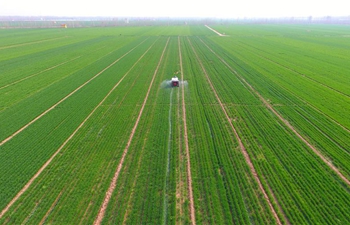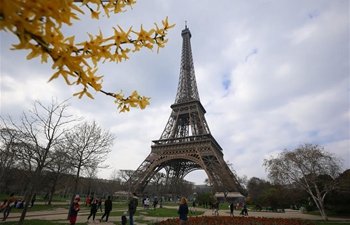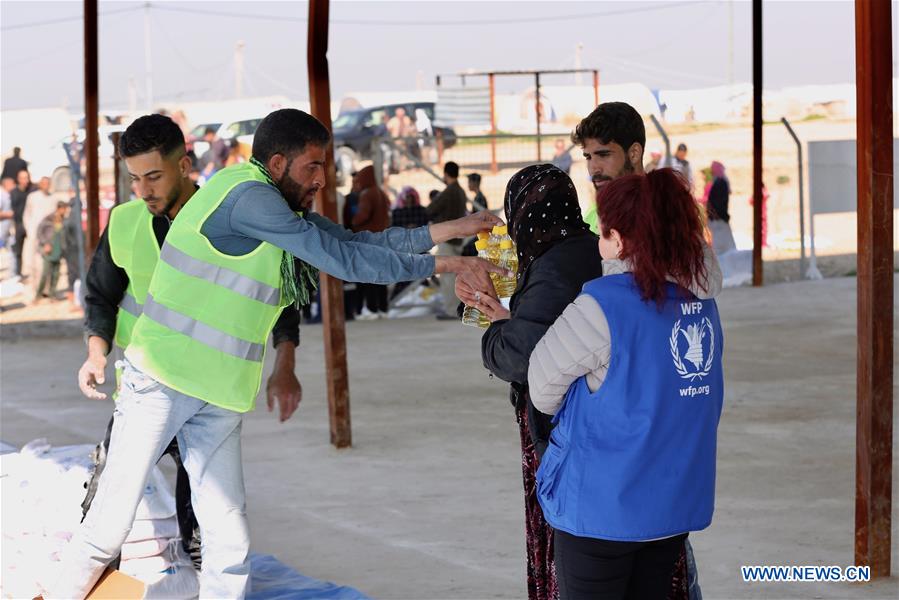
Working staff distribute relief food in al-Salamiyah 1 camp, some 30 km southeast of Iraq's northern city of Mosul, Iraq, March 6, 2019. After more than one year after the military victory against the extremist Islamic State (IS) militants, hundreds of thousands of Iraqi Internally Displaced People (IDPs) are still stranded in camps, facing food shortages while lacking job opportunities and basic services to return home. (Xinhua/Khalil Dawood)
MOSUL, Iraq, March 29 (Xinhua) -- After more than one year after the military victory against the extremist Islamic State (IS) militants, hundreds of thousands of Iraqi Internally Displaced People (IDPs) are still stranded in camps, facing food shortages while lacking job opportunities and basic services to return home.
In al-Salamiyah 1 camp, some 30 km southeast of Iraq's northern city of Mosul, rows of dust-color tents shelter nearly 1,400 families.
Most of these miserable people are confronting misery and multiple challenges, hardship and poverty, as the forgotten humanitarian crisis in Iraq entered its fifth year.
On a visit to the camp during the day of relief food distributions in March, many people were queuing to get their monthly ration of food basket that would keep them alive.
After waiting four weeks and receiving his food ration, 44-year-old Adel Abdullah received the disappointing news that the next distribution will be after six weeks instead of the usual four, the result of the United Nations World Food Program's (WFP) lack of funding from donors.
Families in the camp are mainly depending on the relief food distributed by WFP and its NGO partners.
"The relief food ration is not enough for the 12-person families, as my wife and I have ten children, so we have to buy some food from others and sometimes I have to borrow money for that," Abdullah told Xinhua, showing his displaced person's ID.
Abdullah, like other families in the camp, has been queuing for the food basket which consists of 30 kg of flour, 15 kg of rice, 5 kg of sugar, 5 kg of bulgur, 5 liters of edible oil and 750 gram of salt. The quantities of the relief food are distributed to each five-member family to provide each person with 1,800 calories per day.
Abdullah's family has been displaced twice. They used to live in al-Tumairat village in west Mosul, but were forced to leave their home to rent a house in Msheirfa neighborhood also on the west side of Mosul, before they were forced to leave again for al-Salamiyah camp.
While more than 4 million people have returned to their communities, approximately 1.8 million IDPs remain displaced in Iraq.
Like all the families in the camp, Abdullah is not able to return to his destroyed house in his village, even after more than one year of the historic victory over the extremist group.
"Nearly two months ago, I went back to my house in the village and it was totally destroyed, and I had no job for a long time, and no money to rebuild my house," Abdullah said.
He said his village was in ruins and very few families who had some money were able to return and rebuild their houses.
A range of issues from a lack of job opportunities to basic public services, from security threats to stalled reconstruction have been hindering IDPs to return.
"I can work, and my 17-year-old son is also ready to work - doing anything - but where are the opportunities for jobs? There are none at all," Abdullah said.
At a nearby tent in the camp, Falah Salih, 40, painfully remembered his house that he built with five rooms for his 11-member family in his hometown al-Qayrawan near Sinjar, some 120 km west of Mosul.
"I still remember every second when Daesh (IS) militants on May 13, 2017 blew up my house which I built over four years of great effort and sacrifice, because I didn't have enough money. So I used to work hard and whenever I collected some money, I built a part of the house until I gradually finished," Salih said.
"I watched from afar when Daesh (IS) blew up my house, and the neighboring houses of my three brothers. My brothers and their families are all living here in the camp," Salih said, while spreading out some mattresses and blankets on ropes outside the tent to dry out the moisture.
"I will never forget this day because it was the darkest day in my life," Salih continued with great sorrow.
Salih and his family have been living in the camp ever since and are not able to return because he cannot afford to rebuild his home on top of the food shortages he is now experiencing in the camp.
"At least I don't have to pay money for rent, water and electricity in the camp," he added, hoping for more relief food to feed the mouths in his tent.
Many IDPs in al-Salamiyah 1 camp lament the food shortages and that they have no job opportunities, while pleading for more assistance from the government and the international community to help with rebuilding their homes and their lives.
Revan Shamoon Danyal, deputy camp manager of al-Salamiyah 1, spoke of the harsh situation in the camp and ascribed the food shortages to the lack of funding given to WFP.
"We are doing our best, as camp administration, to provide the minimum basic services to the families in order to preserve their dignity, as long as they are living in the camp," said Danyal.
He said most of the IDPs in the camp are from Mosul and its surroundings, especially Sinjar and the al-Ba'aj area in Iraq's northern province of Nineveh.
Danyal said that between 25 and 30 families choose to leave the camp each month and return to their homes, but there are always between 20 and 50 families coming back to the camp each month.
As many as 54 percent of Iraqi IDPs have been displaced for three or more years, according to the latest figures from the UN.







